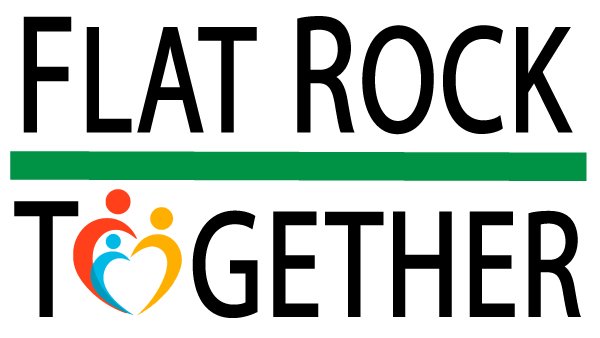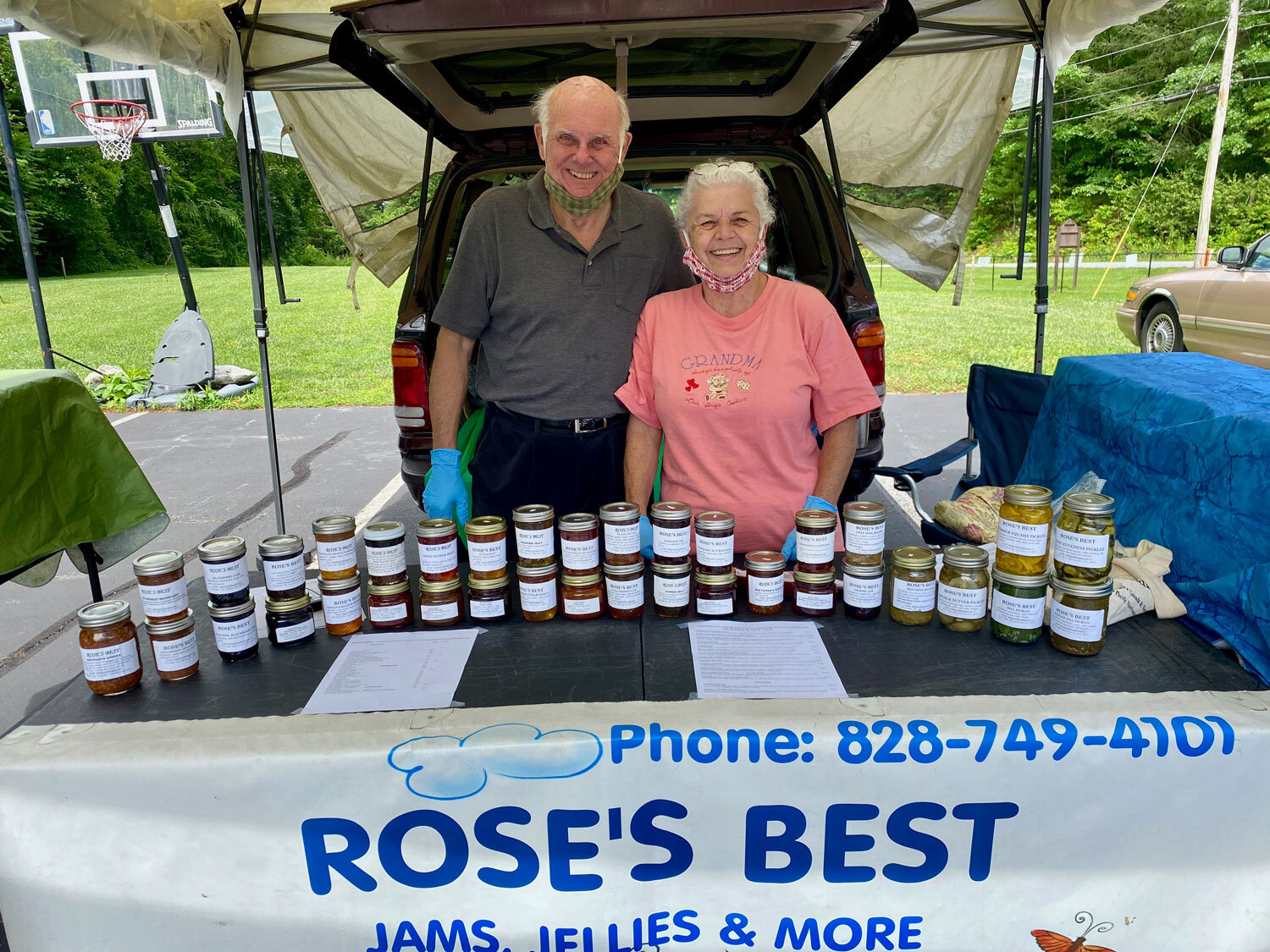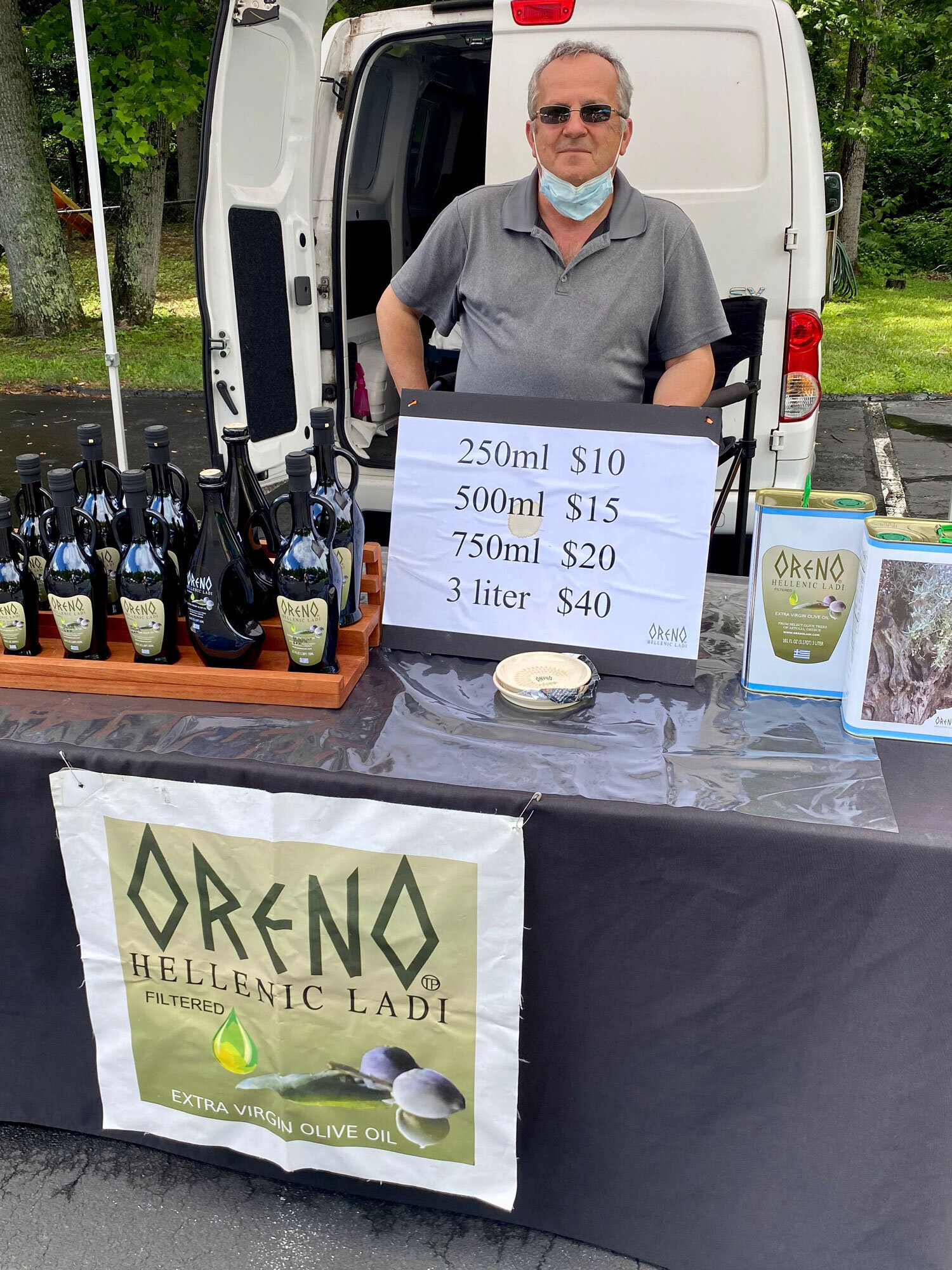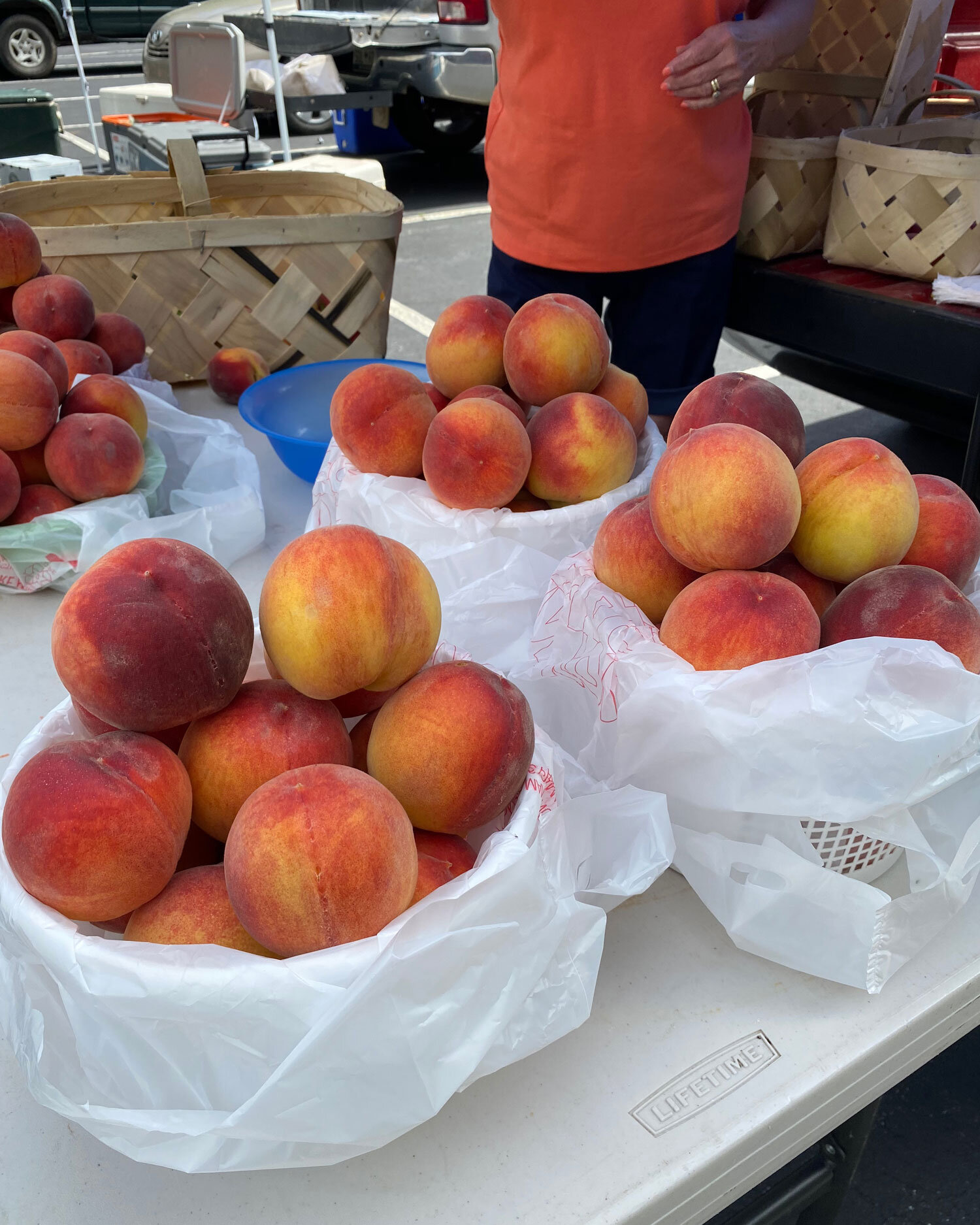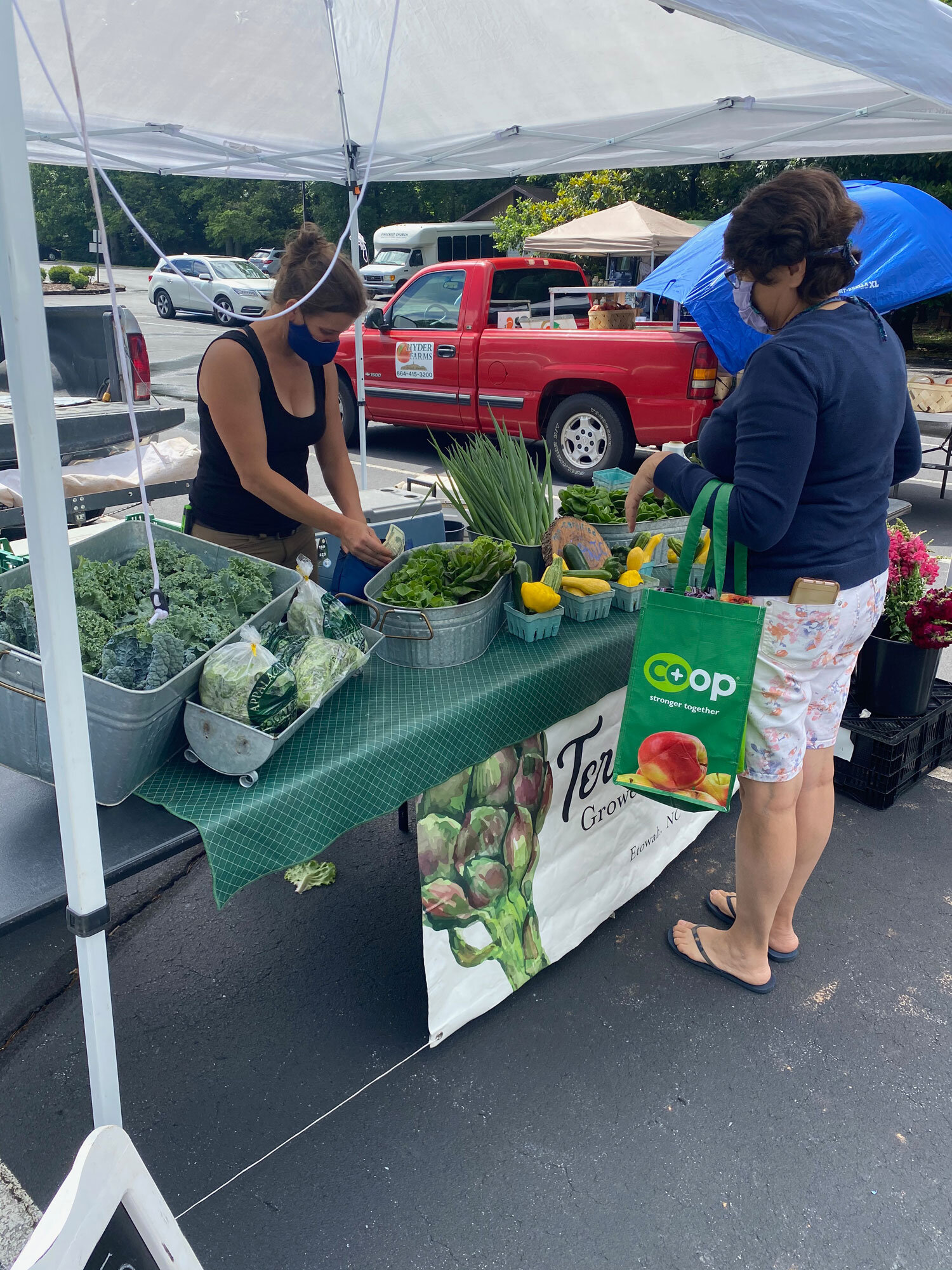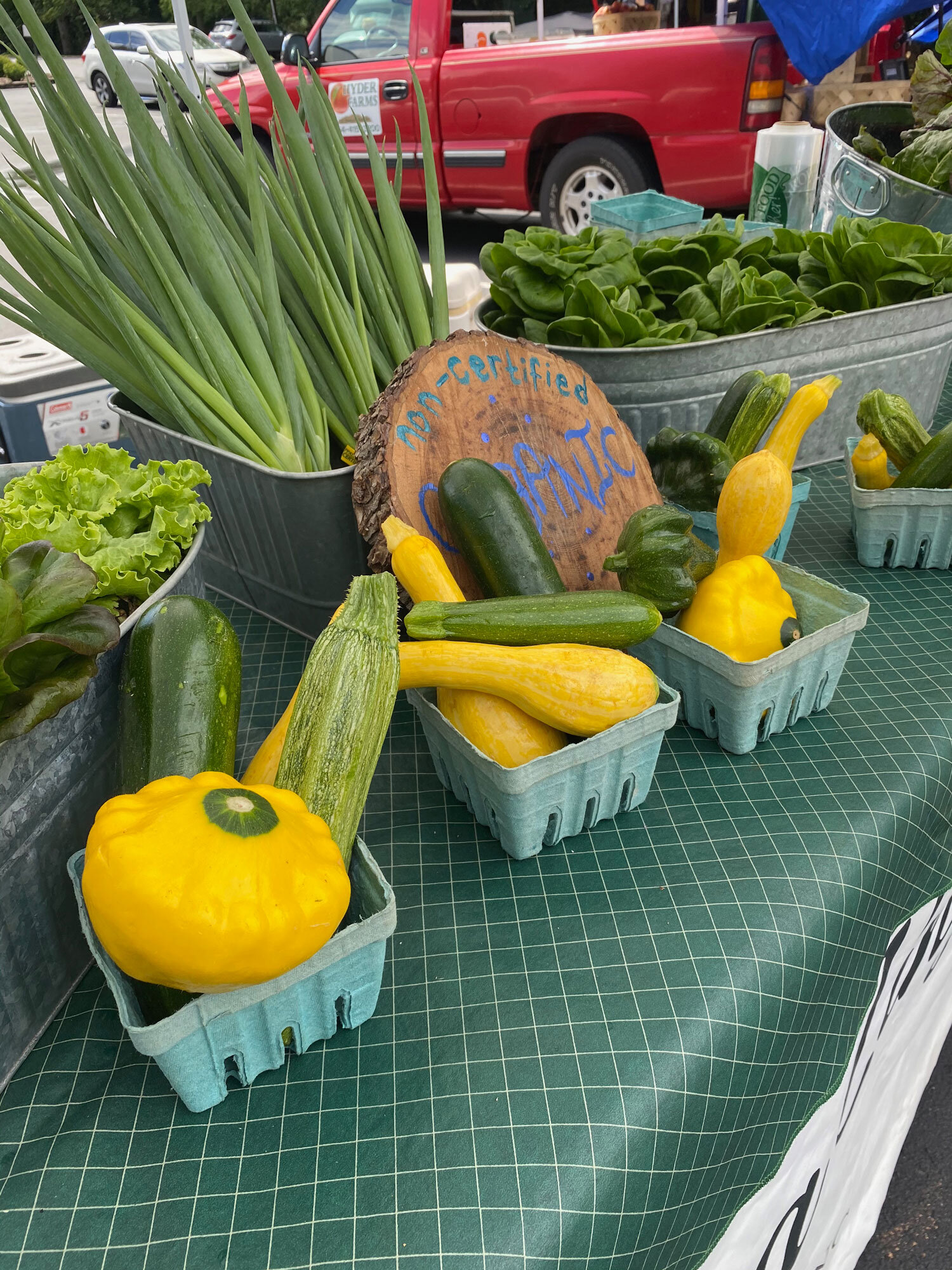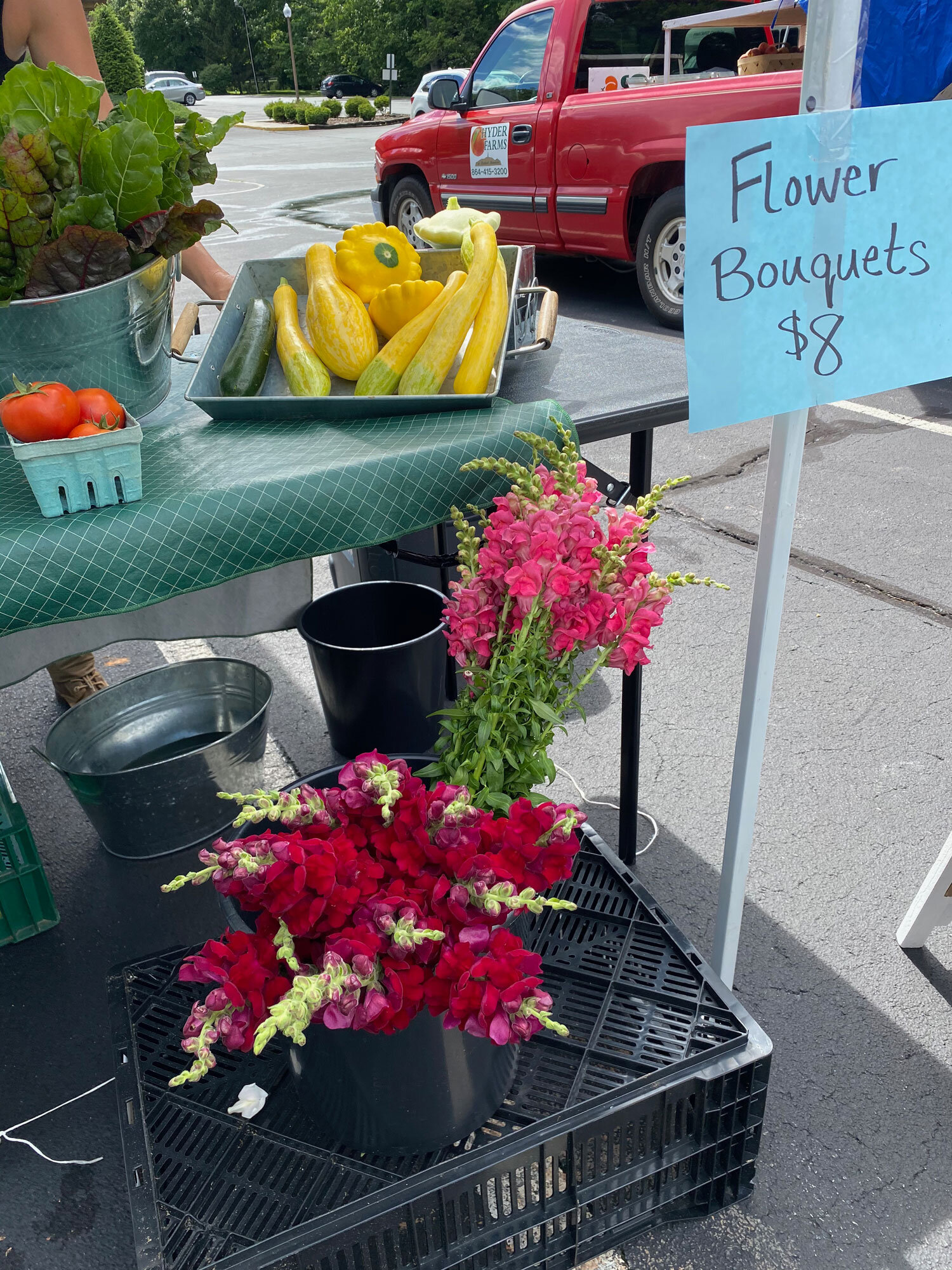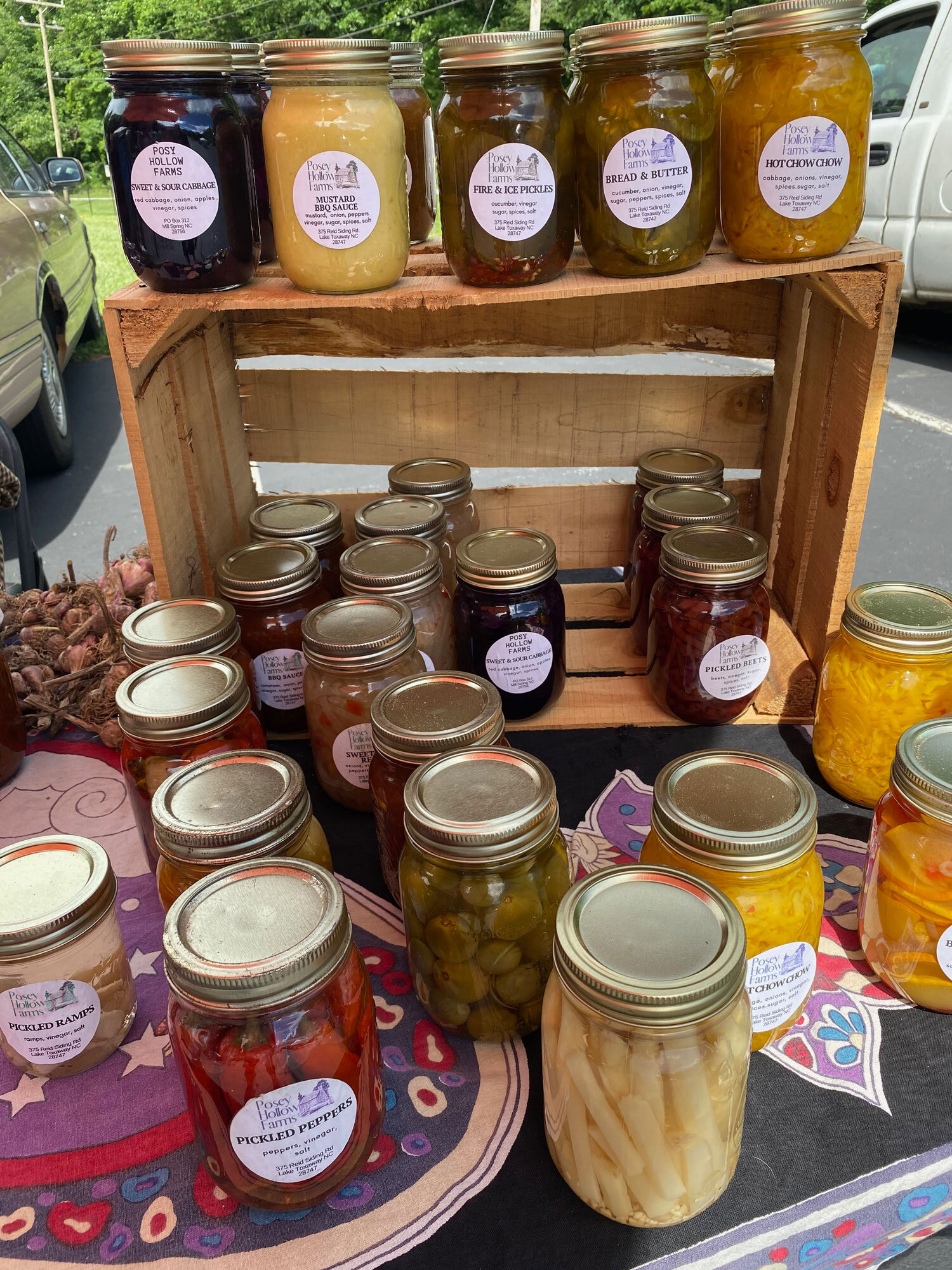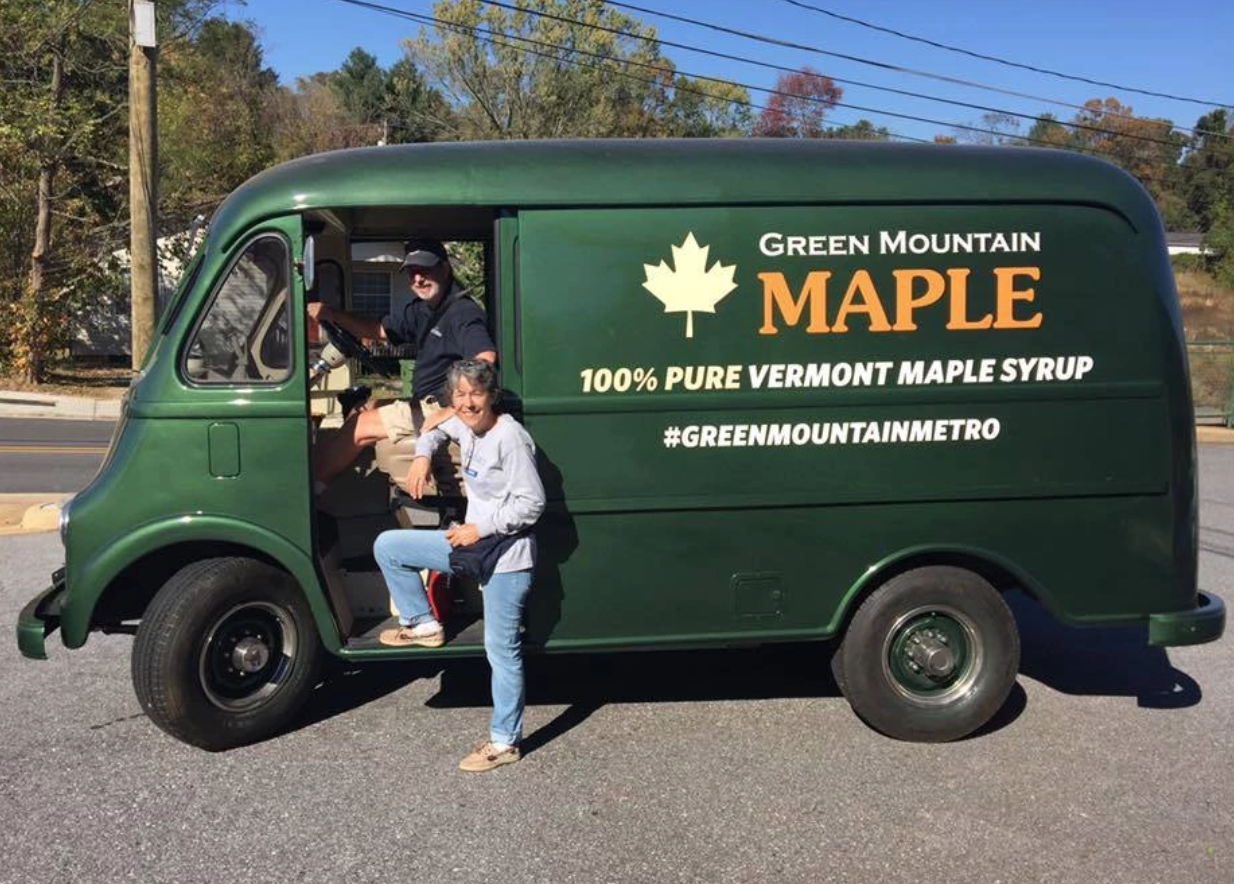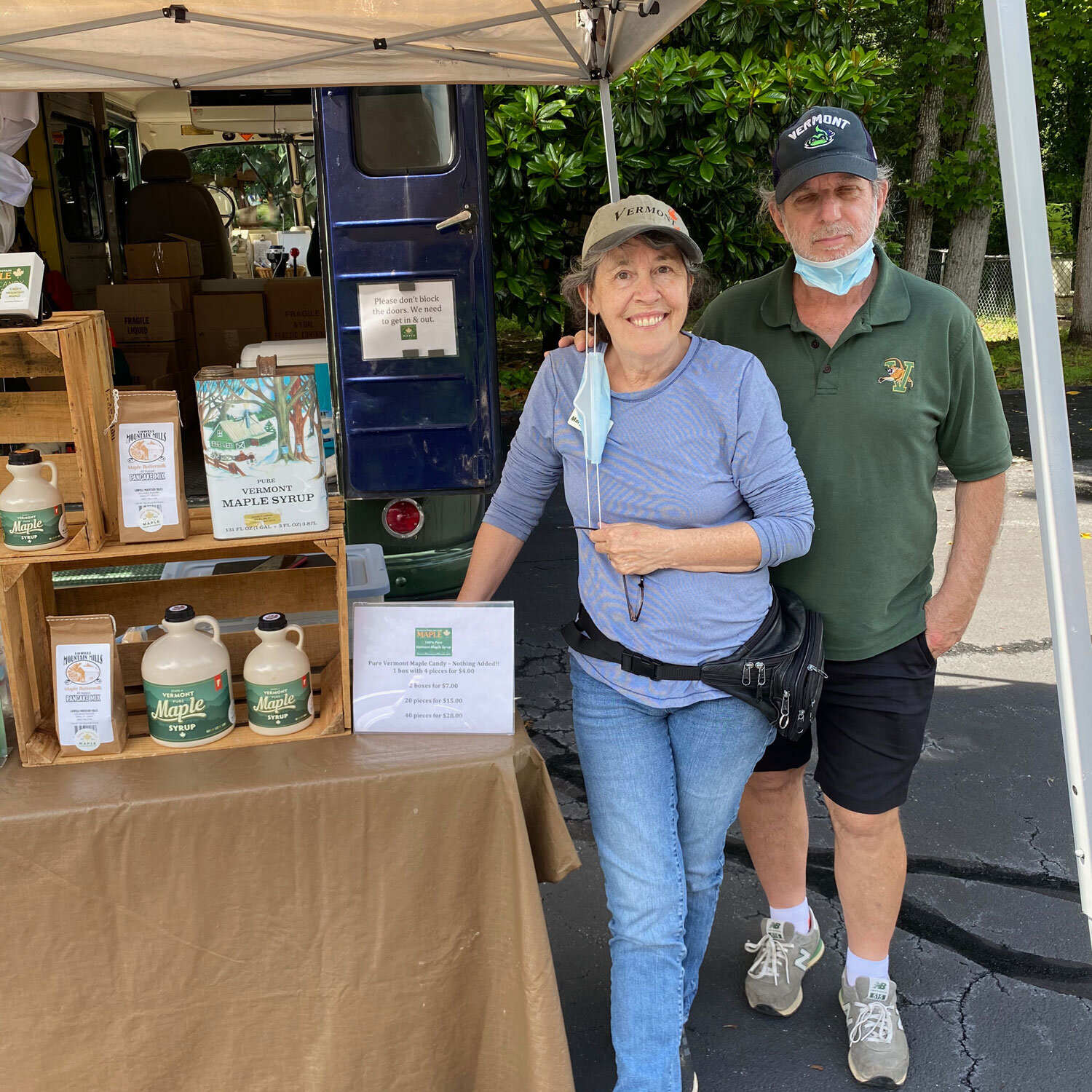Supporting Local for a Better World: The Flat Rock Farmers Market
/Established in 2005, The Flat Rock Farmers Market provides Henderson County residents with local produce and hand-crafted goods while supporting the local food movement. Every Thursday from 3pm to 6pm, you can find 12-15 local vendors set up under tents or working out of the back of their trucks in the parking lot of the Pinecrest Presbyterian Church at the corner of Highland Lake Road and Greenville Highway.
The FRFM came into existence when three local women decided that the Village would benefit from better access to local produce. Molly Sharp Vorhees and her husband vacationed in Europe and were so impressed with the fresh markets there that they decided it would be a great idea to start one in Flat Rock. Molly was in a gourmet dinner group with Cheryl Stippich and Saundra Poces and recruited them in the effort to start a Farmers Market in Flat Rock.
An early Flat Rock Farmers Market
The three intrepid Farmers Market novices secured 1/2 of the parking behind Little Rainbow Row and set out to recruit vendors they particularly wanted to have at the new market. Their efforts were so successful that they ended up with a backlog of vendors willing to bring their produce and wares to Flat Rock. “Since most markets are open on Saturdays,” explained Cheryl, “we decided on Thursday afternoons. That way people could plan meals and have the food needed for the weekend. It was truly a learning experience, but I wouldn't have traded it for the world. Getting to know the farmers and food producers on such a personal level was a joy and going to the market is like visiting old friends.”
One of those first vendors was Paul Shoemaker with Holly Springs Farm in Mills River. Paul was a retired Professor of Plant Pathology who spent much of his career at NCSU's Mountain Horticulture Research and Extension Center in Mills River, researching tomato and other vegetable diseases affecting mountain farmers.
Pau and Simone Shoemaker of Holly Springs Farm
Paul’s tenure at NCSU (1978-2004) preceded the growing trend towards a resurgence of the local farmer and the FRFM was the perfect opportunity to get involved. “When I retired the local food movement was really starting out. And I wanted to be a part of that because I saw the potential for it.”
Paul points to the Holly Springs Farm display table and explains that everything was harvested just a few hours before he and his wife Simone arrived at the Flat Rock market. “You can’t get any fresher. Our lettuce, beets, green onions, sugar snap peas … all harvested today. And as far as the nutritional value, you can't get any better.”
Jessica Spiegel of Terra Lingua Growers
Jessica Spiegel of Terra Lingua Growers does a brisk business selling a variety of organically grown produce that she raises on her 13-acre farm in Landrum, SC. Although born and raised in North Carolina, Jessica surprisingly learned about farming in Alaska. “In Alaska, I ended up working as a greenhouse technician and later managed a big farm up there. But I got sick of the very short growing season,” she says with a laugh.
Jessica, age 39, is also part of a growing number of younger farmers helping to propel the local, organic food movement. “I think small sustainable farms are definitely the way forward. We have enough evidence now that the way conventional farming operates just isn't sustainable at all. I don't think the whole world needs to transition to relying on small farms, but we need more of them for sure.”
In a day when it feels as if more and more young people are flocking to larger, more exciting urban areas, Jessica has a decidedly different world view and is pursuing what she finds to be a rewarding lifestyle. “I love being outside all the time. You get to be around people sometimes in events like this, and then you're alone a lot of time too. So it's a nice balance. It's hard work. You have to get used to never going on vacation and not having a lot of free time, but in the winter you still have some down time. So again, it's a nice balance.”
Jeff Tempest, who co-manages and organizes the FRFM with Paul has been a farmer since he was a young boy. “I've been doing farmer's markets probably since I was 12 and in Pennsylvania. I did the Trenton farmer's market and I worked for an orchard up there” Four years ago, the previous market manager stepped down and Jeff stepped into the breach to keep the FRFM operating.
Jeff is quick to point out that produce at the FRFM is not only fresher and better tasting, it also hasn’t been picked, packed, shipped, packed again, and set out in a grocery store. “You know, the food is a lot fresher because only one person has handled the produce. And most vendors at the farmer's markets do not spray with pesticides or herbicides. So you're typically getting more chemical-free.”
Shoppers will also find many items besides vegetables and fruit at farmers' markets. On this Thursday, Jaimie Smoak is selling fresh seafood from the Low Country out of the back of his pick-up truck - and there is a long line of customers waiting for him when the market opens at 3 pm. Don and Margaret are selling Vermont Maple Syrup out of the back of their distinctive Vermont green 1961 International Harvester Metro Van. After harvesting the maple sap and producing the syrup in Vermont during the late winter and early spring, Dan and Margaret hit the road in their truck. Like many of the vendors, the experience isn’t just about the money. They even have a mission statement that states in part, “Taking pride in sharing a portion of our profits with our partner charities in Vermont & North Carolina while having fun at the same time.”
George Coundoussisas travels to the FRFM from his home in Greenville to sell and promote olive oil which is produced in George’s native Greece. His passion is to provide customers with a true, traditional, honest, and authentic product. And customers can tell the difference. “I had a lady today who bought last week,” George says. “She bought a small bottle and then she came back today for a larger bottle. She said, ‘I'm a foodie. And I found what I needed!” George enjoys both the business and social aspects of Farmers' markets. “As long as I'm in good health, I'll do business with pleasure. I'll go and have fun. I like it because I have friends and acquaintances and get to see people and catch up with them at the markets.”
Rose and John Britton with Rose’s Best
Rose and John Britton of Saluda are retired and also enjoy the social aspect of the market … and the opportunity to make a little extra money for things around the house. “It's a perfect opportunity for Rose to sell her jams and jellies without going big scale,” says John. “We’ve got a lot of regular customers that we stay in touch with. Rose has a lengthy email list. She emails them every week to tell them what we've got available at the market this week, it's just something we really enjoy doing.” Smiling at Rose he adds, “She’s very good at it. That's why we get all the repeat business.”
At the end of the day, no one is getting rich at a Farmers Market. It is a place where people can sustain their passion and share their produce and crafts with people who appreciate the hard work and sacrifice that goes into providing local produce. And the vendors sincerely appreciate the support. “It's been fantastic for me. I have a good following of loyal customers, people that actually care about something being local and sustainably grown,” says Jessica
Paul points out that there are residual benefits to supporting smaller local farms besides food that is fresher and healthier. “Small farms are helping to preserve the land. A lot of people move here because of the farms and beautiful countryside. Small farmers are helping to preserve that beauty.”
The future of the Farmers Market seems bright. “I think people are much more health-conscious and they have a better understanding of what organic means and sustainably-grown means,” says Jessica. “And people are starting to realize it's not only good for you, but it's also good for the planet.”
So the next time you are driving by the Flat Rock Farmers Market on a Thursday afternoon, be sure to stop in. Not only will you find some excellent produce and interesting crafts, but you will meet a lot of very personable and interesting people who are working to make our world a better place to live, work, and eat.
To learn more about the FRFM and their regular vendors here.
